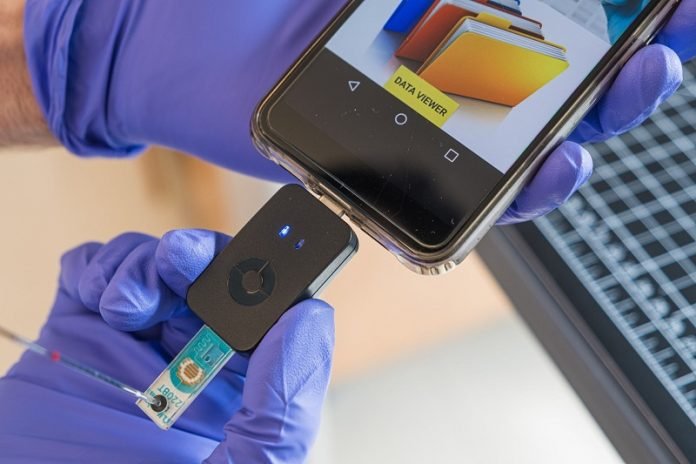
COVID-19 can be diagnosed in 55 minutes or less with the help of programmed magnetic nanobeads and a diagnostic tool that plugs into an off-the-shelf smartphone, according to Rice University engineers.
Mechanical engineer Peter Lillehoj has developed a stamp-sized microfluidic chip that measures the concentration of SARS-CoV-2 nucleocapsid (N) protein, a biomarker for COVID-19, in blood serum from a standard finger prick.
The nanobeads bind to SARS-CoV-2 N protein in the chip and transport it to an electrochemical sensor that detects minute amounts of the biomarker.
The researchers argue that their process simplifies sample handling compared to swab-based PCR (polymerase chain reaction) tests that are widely used to diagnose COVID-19 and need to be analyzed in a laboratory.
“What’s great about this device is that it doesn’t require a laboratory,” Lillehoj said.
“You can perform the entire test and generate the results at the collection site, health clinic or even a pharmacy. The entire system is easily transportable and easy to use.”
The U.S. National Science Foundation-funded research appears in the American Chemical Society journal ACS Sensors.
The new tool relies on a slightly more complex detection scheme but delivers accurate, quantitative results in a short amount of time.
To test the device, the lab relied on donated serum samples from people who were healthy and others who were COVID-19-positive.
Lillehoj said a longer incubation yields more accurate results when using whole serum. The lab found that 55 minutes was an optimum amount of time for the microchip to sense SARS-CoV-2 N protein at concentrations as low as 50 picograms (billionths of a gram) per milliliter in whole serum.
The microchip could detect N protein in even lower concentrations, at 10 picograms per milliliter, in only 25 minutes by diluting the serum fivefold.
“Your mobile phone now is a portable lab to test for COVID-19, using an add-on stamp-sized biochip,” said John Zhang, a program director in NSF’s Directorate for Engineering.



